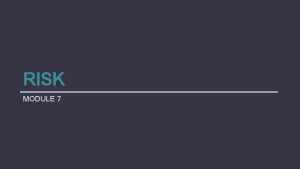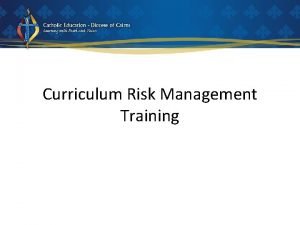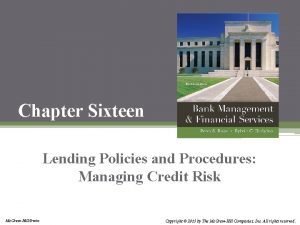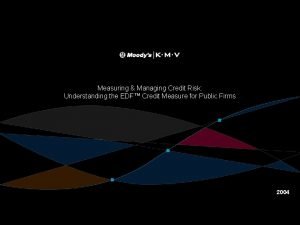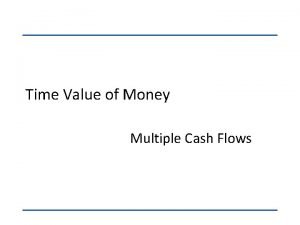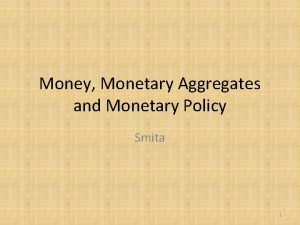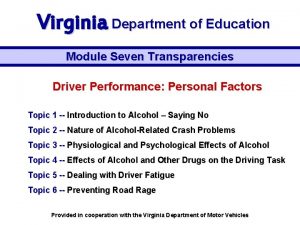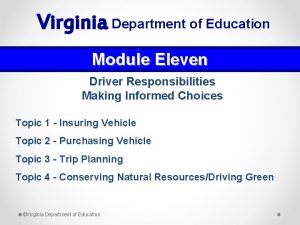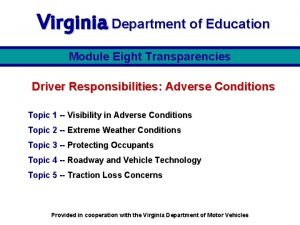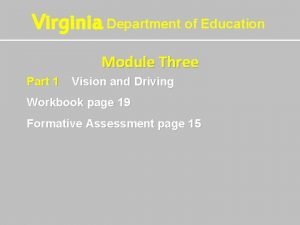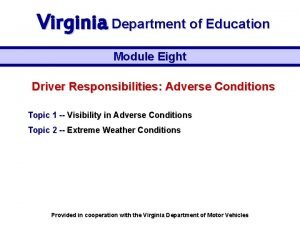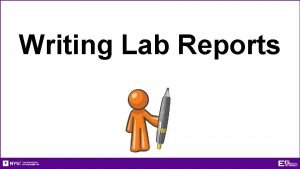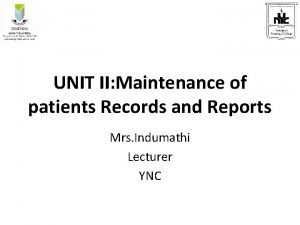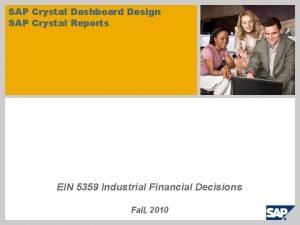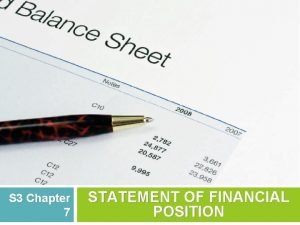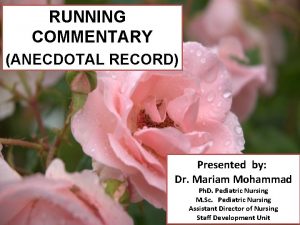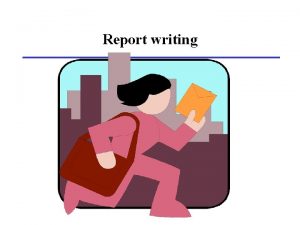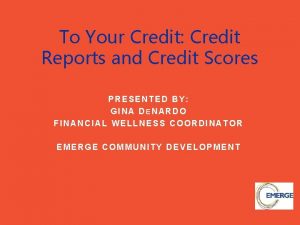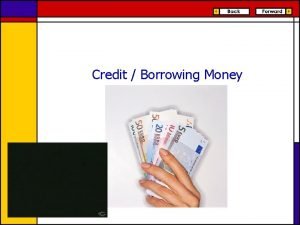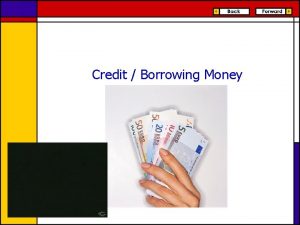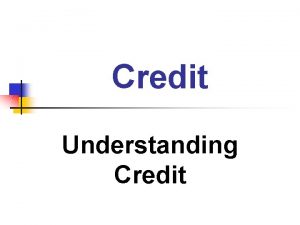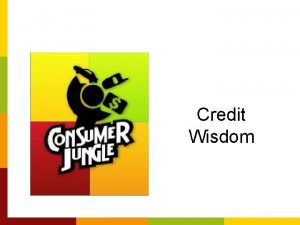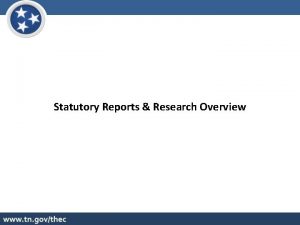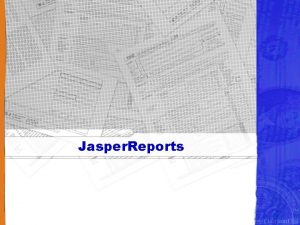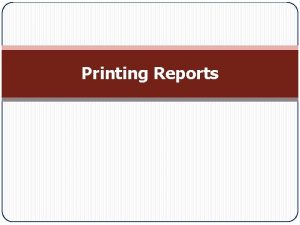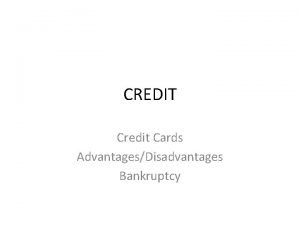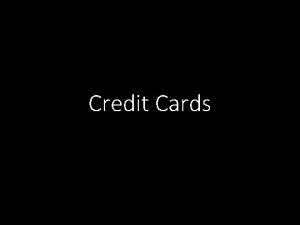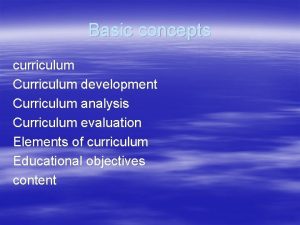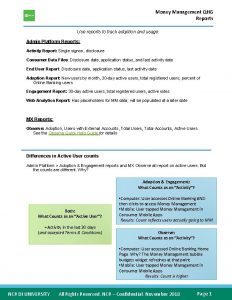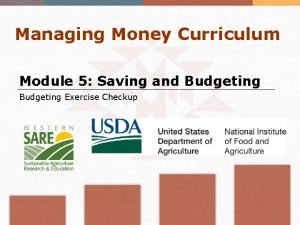Managing Money Curriculum Module 4 Credit Reports Credit

































- Slides: 33

Managing Money Curriculum Module 4: Credit Reports & Credit Scores The importance of keeping track of your information 1

Project Team: • Ruby Ward, Professor, Utah State University • Trent Teegerstrom, Associate Director of Tribal Extension, University of Arizona • Karli Salisbury, Research Associate, Utah State University • Kynda Curtis, Professor, Utah State University • Staci Emm, Extension Educator and Professor, University of Nevada Reno • Carol Bishop, Extension Educator and Associate Professor, University of Nevada Reno Acknowledgments: Vicki Hebb, reviewing content, and Russ Tronstad and Stuart Nakamoto, content. This material is based upon work that is supported by the National Institute of Food and Agriculture, U. S. Department of Agriculture, under award number 2013 -38640 -22175 through the Western Sustainable Agriculture Research and Education program under subaward number EW 14 -017. USDA is an equal opportunity employer and service provider. Any opinions, findings, conclusions, or recommendations expressed in this publication are those of the author(s) and do not necessarily reflect the view of the U. S. Department of Agriculture. Each university is an affirmative action/equal opportunity institution 2

Key Concepts • What Is A FICO Score? • What Is A Good Credit Score? • How Is My Credit Score Calculated? • What Is A Credit Report? • Getting and Checking My Credit Report • What To Do If You Are A Victim Of Identity Theft • Strategies To Improve Credit 3

FICO Score • FICO is an analytics software company that compiles credit data from various credit reporting agencies. • They use that data to run math algorithms and create a score. • FICO® Scores are the credit scores used by 90% of top lenders to determine your credit risk. • Lenders want to know the risk they’re taking by lending you money. For example: • How likely someone is to pay their bills on time? • Can they handle a larger line of credit? 4

FICO Scores DO NOT Consider • Your race, color, religion, national origin, sex, or marital status. • Your age. • Your salary, occupation, title, employer, date employed, or employment history. (Lenders may consider this information, however) • Where you live. • Any interest rate being charged on a particular credit card or other account. • Any items reported as child/family support obligations. • Certain types of inquiries (requests for your credit report). • Any information not found in your credit report. • Any information that is not proven to be predictive of future credit performance. • Whether or not you are participating in credit counseling of any kind. 5

Score Calculation • Scores based on data from credit reports • Separate FICO score for each of the three credit bureaus • Higher is better • For valid score, the credit report must have: • At least one account opened for six months or more, and • At least one account that has been reported to the credit bureau within the past six months, and • No indication of deceased on the credit report 6

FICO Score Components FICO scores based on these 5 categories: • 35% Payment History • 30% Total Debt • 15% Length of Credit History • 10% Credit Mix • 10% New Credit 7

Payment History – 35% • Paying on time one of the most important factors. • Overall good credit more important than missing one or two payments. • Payment history includes: credit cards, retail accounts, installment loans and mortgage loans. • Negative factors: bankruptcies, foreclosures, lawsuits, wage attachments, liens, and judgements. • Late or missed payments: how late, how much owed, how recent, and how many. 8

Total Debt – 30% • Amount owed on all accounts • Amount owed on different types of accounts • Credit utilization on revolving accounts (how much of your available credit you are using) • High percentage- negative impacts • Low percentage- positive impacts- in some cases, better than not using any of your available credit • Someone who is close to "maxing out" several credit cards has a high credit utilization ratio and may have trouble making payments in the future. 9

Length of Credit History– 15% • Longer credit history will increase score BUT new users will not necessarily be negatively impacted • Age of oldest account • Age of newest account • Average of all accounts • Use of certain accounts 10

Credit Mix– 10% • Mix of credit cards, retail accounts, installment loans, finance company accounts, and mortgage loans will be considered. • Has your credit experience been only one type? • Don’t open accounts you won’t use. • Can raise FICO score by having credit cards and installment loans with a good payment history. 11

New Credit – 10% • Don’t open a lot of new accounts quickly • Opening several new accounts in short amount of time represents risk • How many recent inquiries there are (when a lender makes a request for your credit report or score) • Inquiries are on your report for 2 years but only impact your FICO score for 12 months 12

Good, Bad or Ugly? • Scores usually range from 300 to 850 13

Why Should You Care? Compare Costs on a New Vehicle Credit Score of 730+ Credit Score of 679 - Car Cost: $30, 000 Rate: 2. 99% Rate: 7. 25% Term: 60 Months Total Cost: $32, 335 Total Cost: $35, 855 A 51 Point Difference Will Cost You $3, 520! 14

What Would You Do With An Extra $3, 500? 15

Where’s My Score? • Most banking institutions offer a free score, especially to those with credit cards • • • Bank of America- select cardholders - Transunion Citibank –Citibank branded cardholders- Equifax Chase – Chase Slate cardholders- Experian Walmart/Sam’s Club- cardholders- Transunion USAA- all credit card holders- Experian • Discover- May 20, 2016 new service called “Discover Credit Scorecard. ” You do not need to be a customer of Discover – anyone can get their official FICO score for free. This is the first place where anyone, not just a Discover customer, can get their official Experian FICO for free. 16

My Credit Report What’s in it? • Identifying information • Name, address, social security, date of birth, etc. • Credit accounts reported by lenders • Type of account, date opened, credit limit, account balance and payment history • Credit inquiries • Within last two years- voluntary and involuntary • Public record and collections • State and county courts, overdue debt from collection agencies 17

Accessing Your Report • Three credit reporting agencies: • Equifax • Trans. Union • Experian • Can get free copy once every 12 months • You may order all at the same time, or from each of the companies one at a time. • ONLY through annualcreditreport. com or by calling 1 -877 -322 -8228 18

Why Do I Need It? • Your credit report has information that affects whether you can get a loan — and how much you will have to pay to borrow money. You want a copy of your credit report to: • make sure the information is accurate, complete, and up-to-date before you apply for a loan for a major purchase like a house or car, buy insurance, or apply for a job • help guard against identity theft. That’s when someone uses your personal information — like your name, your Social Security number, or your credit card number — to commit fraud. 19

Evaluating Your Report • To protect the security of your personal information, you may be asked a series of questions that only you would know, like your monthly mortgage payment • If you request your report online at annualcreditreport. com, you should be able to access it immediately. • Three Things to Look For: • Is your information accurate? • What are your balances? • Are there any creditors on your report that you supposedly owe that you don’t remember doing business with? 20

Fixing Errors • All 3 credit bureaus accept filing disputes online • Contact the bureau and the creditor • Sample letter available at: https: //www. consumer. ftc. gov/articles/0384 -sample-letter-disputingerrors-your-credit-report • Will be investigated within 30 days • Will receive the written results and a free copy of your revised report 21

Identity Theft If you know there has been I. D. theft contact: • EQUIFAX: 1 -877 -576 -5734; WWW. ALERTS. EQUIFAX. COM • EXPERIAN: 1 -888 -397 -3742; WWW. EXPERIAN. COM/FRAUD • TRANSUNION: 1 -800 -680 -7289; WWW. TRANSUNION. COM • www. allclearid. com 22

Can’t Pay Bills On Time? • Contact the companies that you owe to work out a repayment plan • Create a budget and stick to it • Pay your home and car loans first • If you know you cannot make your car payment, try to sell your car first. • DO NOT have it repossessed if you can avoid it. 23

How Long Does A Repo Affect Your Credit? 7 To 10 YEARS! 24

Don’t feel like this guy the next time you go to apply for a loan. 25

Improving Your Score • Fix errors • When negative information in your report is accurate, only time can make it go away • Beware of any advice that claims to improve your credit score fast. • Reputable credit counseling organizations • There is help out there to get your credit score on track www. consumerfinance. gov 26

Tips and Strategies (From my. FICO. com) • Right Now • Check your credit report • Set up payment reminders • Reduce the amount of debt you owe • Payment History Tips • Pay your bills on time • If you have missed payments, get current and stay current. • If you are having trouble making ends meet, contact your creditors or see a legitimate credit counselor. 27

Tips and Strategies (From my. FICO. com) • Amounts Owed Tips • Keep balances low on credit cards and other "revolving credit". • Pay off debt rather than moving it around. • Don't open a number of new credit cards that you don't need, just to increase your available credit. • Length of Credit History Tips • If you have been managing credit for a short time, don't open a lot of new accounts too rapidly. 28

Tips and Strategies (From my. FICO. com) • New Credit Tips • Do your rate shopping for a given loan within a focused period of time. • Re-establish your credit history if you have had problems. • Note that it's OK to request and check your own credit report. • Types of Credit Use Tips • Apply for and open new credit accounts only as needed. • Have credit cards – but manage them responsibly. 29

Homework Assignments: 1. Use www. annualcreditreport. com to request and print at least one report from one of the credit bureaus 2. Use ‘Discover Credit Scorecard’ or your bank website to get your free FICO score 30

Money Management Review • Module 1 Record Keeping: • Keep track of your cash flows • A good set of financial records will help you build a budget and make better financial choices • Module 2 Loans and Credit Cards: • Use the My. Fi app to become more savvy about credit card usage • Build a budget that will help you become independent form credit cards • Module 3 5 C’s of Borrowing: • Know what a lender looks for in a borrower • Knowing the factors for loan approval will give you an advantage for a loan with a good rate • Module 4 Credit Scores: • Understand what determines a FICO score • Understand how to access a credit report • Know how to rebuild bad credit 31

Next Module: • Money Management Module 5: Savings and Budgeting – Budgeting Exercise Check-up • Will cover the differences between a long-term and short-term savings goal • Understand the components of a good savings goal vs. a bad savings goal • Cover the different places money can be saved • The impact of inflation on savings • Budget Check-up: How to budget savings? 32

Questions? 33
 Dana damian
Dana damian How do informational reports and analytical reports differ
How do informational reports and analytical reports differ Managing someone elses money
Managing someone elses money Module 4 topic 5 turnabouts and parking
Module 4 topic 5 turnabouts and parking Module 4 topic 1 assessing and managing risk
Module 4 topic 1 assessing and managing risk Module 7 managing risk answer key
Module 7 managing risk answer key Curriculum activity risk management guidelines
Curriculum activity risk management guidelines Credit unit test
Credit unit test Lending policies and procedures managing credit risk
Lending policies and procedures managing credit risk Measuring and managing credit risk
Measuring and managing credit risk Gatsby
Gatsby Money smart money match
Money smart money match Money on money multiple
Money on money multiple Context of great gatsby
Context of great gatsby The great gatsby historical context
The great gatsby historical context C device module module 1
C device module module 1 Liquidity adjustment facility
Liquidity adjustment facility Module 10 drivers ed virginia
Module 10 drivers ed virginia Curriculum guide for driver education in virginia module 7
Curriculum guide for driver education in virginia module 7 Curriculum guide for driver education in virginia module 11
Curriculum guide for driver education in virginia module 11 Module 8 topic 1 drivers ed
Module 8 topic 1 drivers ed Curriculum guide for driver education in virginia module 3
Curriculum guide for driver education in virginia module 3 Yaw drivers ed
Yaw drivers ed Module 5 topic 2 drivers ed
Module 5 topic 2 drivers ed Module 7 topic 1 distracted driving
Module 7 topic 1 distracted driving This can be avoided by giving credit where credit is due.
This can be avoided by giving credit where credit is due. Purpose of writing reports
Purpose of writing reports Future tense of report
Future tense of report Maintenance of patient records and reports
Maintenance of patient records and reports Crystal reports dashboard
Crystal reports dashboard Internal users of financial reports
Internal users of financial reports Nursing anecdotes examples
Nursing anecdotes examples Objective in report writing
Objective in report writing Pscb custom reports
Pscb custom reports





